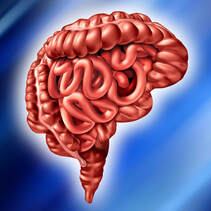For patients who mainly report having digestive and similar issues, it’s so important for health care practitioners to fully appreciate and also look closely at the neurologic, neuroimmune and inflammatory nature of the condition. The central nervous system (CNS) is an important regulator of the gastrointestinal (GI) tract and CNS dysfunction can manifest in significant and disabling GI-related symptoms. We know that our gut-brain axis incorporates bi-directional signals from the CNS, autonomic nervous system, enteric nervous system, gut microbiota, and the body’s immune system to respond to the dynamic needs of human physiology. So when something on this “information highway” goes awry, there is significant potential for the blood-brain barrier (BBB) to be breached and other problems to take hold – which points further to the importance of maintaining a healthy microbiome.  Researchers have long-studied the relationship of the microbiome and multiple sclerosis, for example.1 And in this recent abstract, scientists looked at a host of neuroinflammatory diseases that can potentially cause GI dysfunction, including primary CNS conditions such as multiple sclerosis, neuromyelitis optica spectrum disorder, myelin oligodendrocyte glycoprotein-associated disorder, and autoimmune encephalitis (AE). Additionally, peripheral nervous system (PNS) diseases that may impact the gut include: Guillain-Barre syndrome; chronic inflammatory demyelinating polyneuropathy; acute sensory-autonomic neuropathy/acute motor-sensory-autonomic neuropathy; acute autonomic ganglionopathy; myasthenia gravis; and acute autonomic neuropathy with paraneoplastic syndrome. Finally, collagen diseases, such as Sjogren syndrome and systemic sclerosis, and celiac disease affect both the CNS and PNS.  The investigators’ key takeaway from this study is that many neuro-associated GI dysfunctions actually “may predate or present concurrently with brain, spinal cord or peripheral nerve dysfunction.” Given their symptoms, patients initially may seek counsel from their primary care physicians or gastroenterologists, potentially delaying the appropriate neurological diagnosis. As the study scientists concluded “awareness of these phenomena among general practitioners and collaboration between gastroenterologists and neurologists are highly recommended in order for their early diagnosis and optimal management, as well as for systematic documentation of their presentations and treatment.”2 With a multi-symptom disease such as multiple sclerosis, it is critical for us to evaluate each issue and regularly communicate with any other consulting physicians for the most comprehensive assessment of any condition. And as we have consistently advised, patients with any neurological diagnosis must be fully informed about the benefits of adhering to a healthy diet. As we have often noted, we really are what we eat - and research continues to point at the gut microbiome as the foundation of not just our digestive health, but ultimately at our brain’s wellbeing too. For more about nutritional approaches in MS, please visit our Medical Resources section to download our comprehensive guide. In health, Dr. Suzanne Gazda References: 1 The microbiome in multiple sclerosis. https://www.suzannegazdamd.com/scientifically-speaking1/the-importance-of-the-microbiome-in-multiple-sclerosis 2 Sakakibara R. (2021). Gastrointestinal dysfunction in neuroinflammatory diseases: Multiple sclerosis, neuromyelitis optica, acute autonomic ganglionopathy and related conditions. Autonomic neuroscience : basic & clinical, 232, 102795. Advance online publication. https://doi.org/10.1016/j.autneu.2021.102795
8 Comments
Karen McNicholas
7/21/2021 09:11:26 am
I was diagnosed of Parkinson's Disease a couple of years ago, I had severe fatigue, difficulty with mobility and sleeping. I was given medications which helped but only for a short while. So i decided to try alternative measures and began on Parkinson's HERBAL TREATMENT from Kykuyu Health Clinic, It made a tremendous difference for me (Go to their website www. kykuyuhealthclinic. com ). I had improved walking balance, muscle strength and improved vision
Reply
wanhe steve
9/20/2022 12:00:42 am
I never thought i could smile and be in a happy marriage again if not for the help of DR.Moses Buba. I got the doctors Emails:([email protected] ) on the internet and i emailed him, and he got back to me with some encouraging words, he got me some herbs cream which i use for just 8 days and i began to feel the enlargement of my penis, and without surgery. This went on for a little period of about 10 days and to my surprise my wife keeps screaming that she love my big dick now. Now my wife no longer cheat on me, and my penis is now about 10.5 inches long on erection and off course very large round. And now my wife uses breasts, hips and bums enlargement. I and my wife are very happy for the help rendered to me by DR.Moses Buba, and i want to say a big thanks to Doctor for the help. You can contact the Doctor now on his Email:( [email protected] ) Am thankful to the doctor for helping me.
Reply
This Blog Is Very Helpful And Informative For This Particular Topic. I Appreciate Your Effort That Has Been Taken To Write This Blog For Us. neurorehabilitation, guillain barre syndrome treatment, neuro physiotherapy, treatment of gbs, neurological rehabilitation, neurological physiotherapy, guillain barre disease, guillain barre syndrome pathophysiology, neuro physiotherapist near me, neuro rehabilitation centre, guillain barre, guillain barre syndrome symptoms. <a href="https://curerehab.in/Guillain-Bare-Syndrome-Rehabilitation"> physiotherapy in Hyderabad </a>
Reply
This Blog Is Very Helpful And Informative For This Particular Topic. I Appreciate Your Effort That Has Been Taken To Write This Blog For Us. neurorehabilitation, guillain barre syndrome treatment, neuro physiotherapy, treatment of gbs, neurological rehabilitation, neurological physiotherapy, guillain barre disease, guillain barre syndrome pathophysiology, neuro physiotherapist near me, neuro rehabilitation centre, guillain barre, guillain barre syndrome symptoms. <a href="https://curerehab.in/Guillain-Bare-Syndrome-Rehabilitation"> physiotherapy in Hyderabad </a>
Reply
This Blog Is Very Helpful And Informative For This Particular Topic. I Appreciate Your Effort That Has Been Taken To Write This Blog For Us. neurorehabilitation, guillain barre syndrome treatment, neuro physiotherapy, treatment of gbs, neurological rehabilitation, neurological physiotherapy, guillain barre disease, guillain barre syndrome pathophysiology, neuro physiotherapist near me, neuro rehabilitation centre, guillain barre, guillain barre syndrome symptoms. <a href="https://curerehab.in/Guillain-Bare-Syndrome-Rehabilitation"> physiotherapy in Hyderabad </a>
Reply
This Blog Is Very Helpful And Informative For This Particular Topic. I Appreciate Your Effort That Has Been Taken To Write This Blog For Us. neurorehabilitation, guillain barre syndrome treatment, neuro physiotherapy, treatment of gbs, neurological rehabilitation, neurological physiotherapy, guillain barre disease, guillain barre syndrome pathophysiology, neuro physiotherapist near me, neuro rehabilitation centre, guillain barre, guillain barre syndrome symptoms. <a href="https://curerehab.in/Guillain-Bare-Syndrome-Rehabilitation"> physiotherapy in Hyderabad </a>
Reply
This Blog Is Very Helpful And Informative For This Particular Topic. I Appreciate Your Effort That Has Been Taken To Write This Blog For Us. neurorehabilitation, guillain barre syndrome treatment, neuro physiotherapy, treatment of gbs, neurological rehabilitation, neurological physiotherapy, guillain barre disease, guillain barre syndrome pathophysiology, neuro physiotherapist near me, neuro rehabilitation centre, guillain barre, guillain barre syndrome symptoms. <a href="https://curerehab.in/Guillain-Bare-Syndrome-Rehabilitation"> physiotherapy in Hyderabad </a>
Reply
Mavis Wanczyk
7/20/2023 07:25:27 pm
Being the winner of a multi-million dollar lottery certainly will be a life-changing event for almost every single lottery winner. My name is Mavis Wanczyk from Chicopee, Massachusetts, the famous PowerBall lottery winner of $758 million (£591m). I know many people would wonder how I had won the lottery. Would you believe me if I told you that I did it with spell casting? I met this famous spell caster known as Doctor Odunga and he was the one who did it for me. As shocking as it was to me, my famous comment to the press was “ I’m going to go and hide in my bed.” Never did I believe that Doctor Odunga made me wealthy overnight. If you want to have your chance of winning and becoming very wealthy just like me, contact Doctor Odunga at [email protected] OR WHATS-APP HIM at +2348167159012 and you will be lucky. Thanks for reading and hope to see you at the top
Reply
Your comment will be posted after it is approved.
Leave a Reply. |
AuthorSuzanne Gazda M.D. Archives
July 2024
Categories |

 RSS Feed
RSS Feed